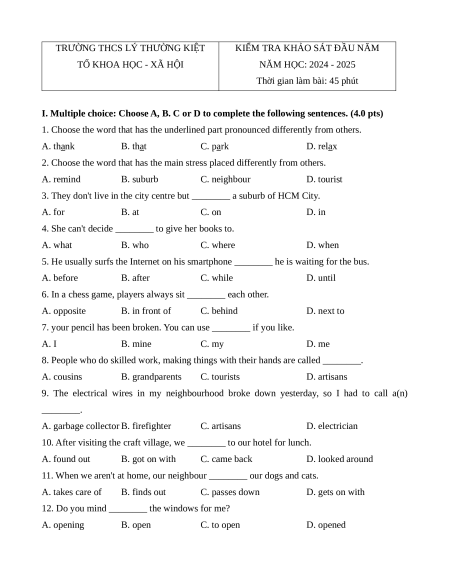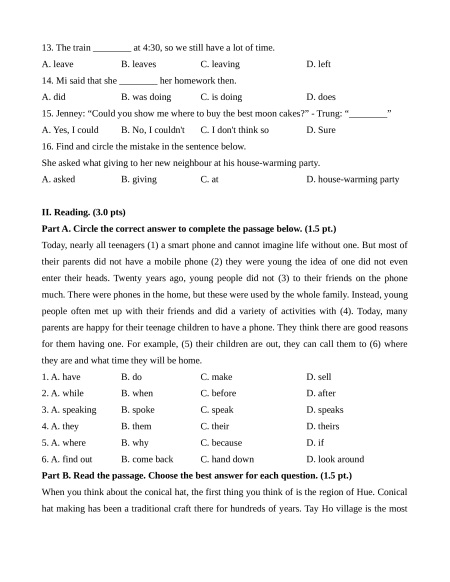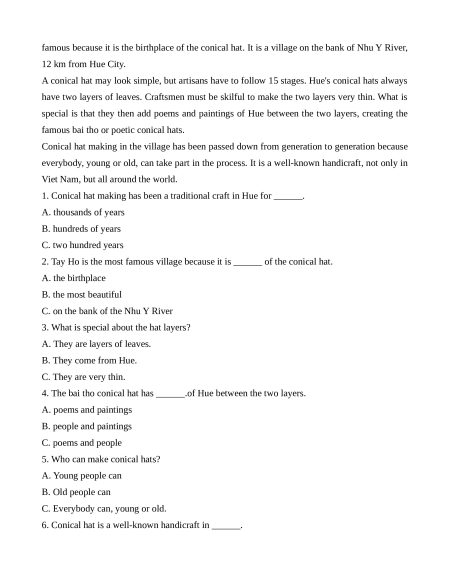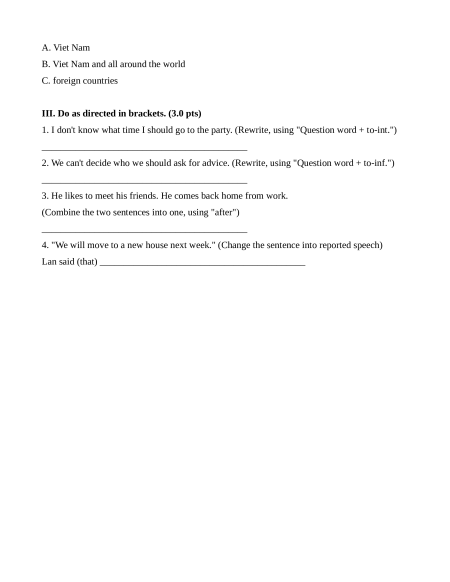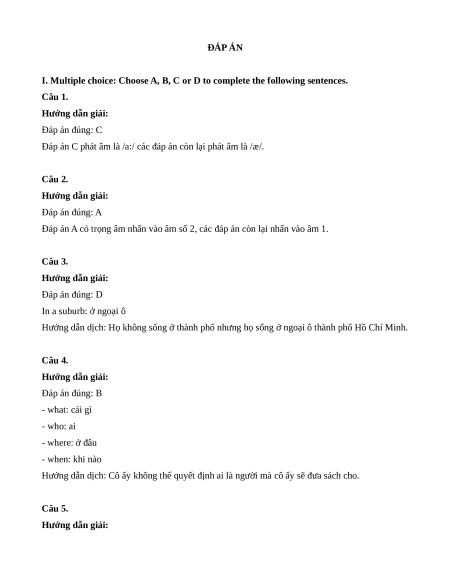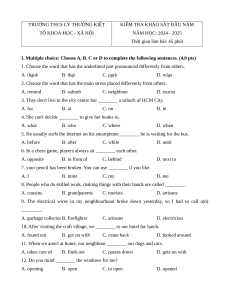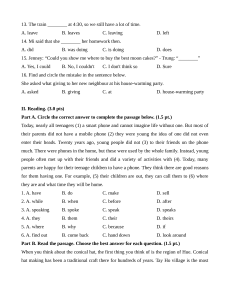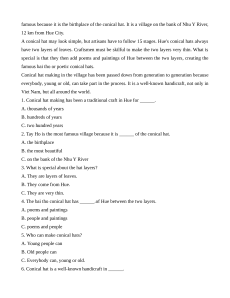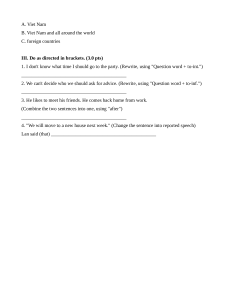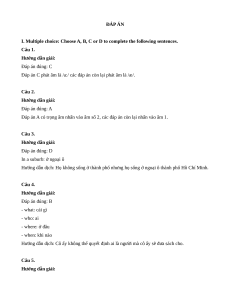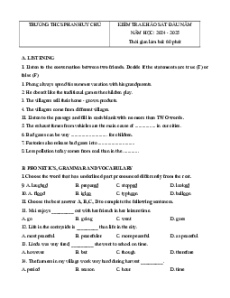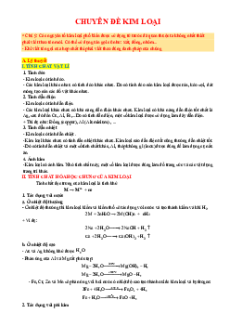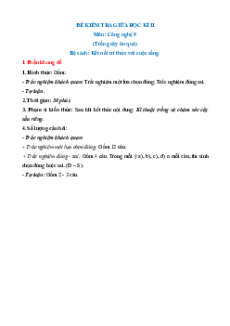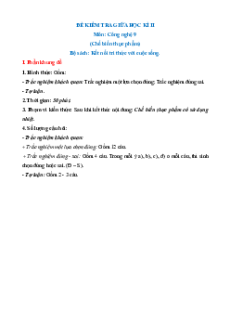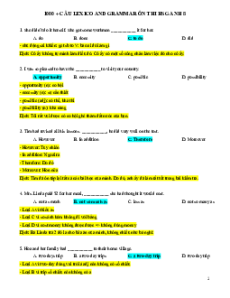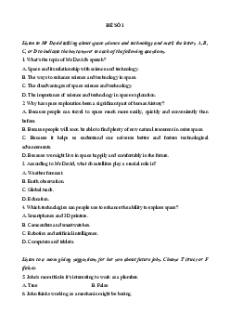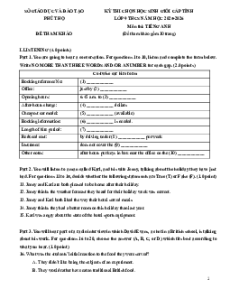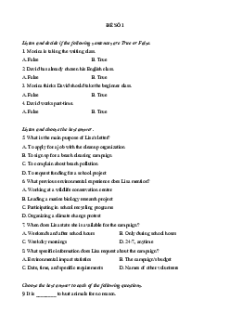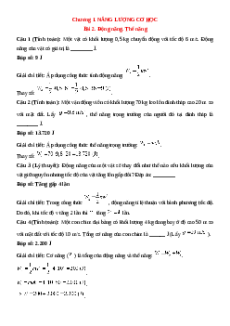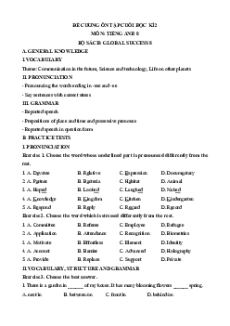TRƯỜNG THCS LÝ THƯỜNG KIỆT
KIỂM TRA KHẢO SÁT ĐẦU NĂM TỔ KHOA HỌC - XÃ HỘI NĂM HỌC: 2024 - 2025
Thời gian làm bài: 45 phút
I. Multiple choice: Choose A, B. C or D to complete the following sentences. (4.0 pts)
1. Choose the word that has the underlined part pronounced differently from others. A. thank B. that C. park D. relax
2. Choose the word that has the main stress placed differently from others. A. remind B. suburb C. neighbour D. tourist
3. They don't live in the city centre but ________ a suburb of HCM City. A. for B. at C. on D. in
4. She can't decide ________ to give her books to. A. what B. who C. where D. when
5. He usually surfs the Internet on his smartphone ________ he is waiting for the bus. A. before B. after C. while D. until
6. In a chess game, players always sit ________ each other. A. opposite B. in front of C. behind D. next to
7. your pencil has been broken. You can use ________ if you like. A. I B. mine C. my D. me
8. People who do skilled work, making things with their hands are called ________. A. cousins B. grandparents C. tourists D. artisans
9. The electrical wires in my neighbourhood broke down yesterday, so I had to call a(n) ________.
A. garbage collector B. firefighter C. artisans D. electrician
10. After visiting the craft village, we ________ to our hotel for lunch. A. found out B. got on with C. came back D. looked around
11. When we aren't at home, our neighbour ________ our dogs and cats. A. takes care of B. finds out C. passes down D. gets on with
12. Do you mind ________ the windows for me? A. opening B. open C. to open D. opened
13. The train ________ at 4:30, so we still have a lot of time. A. leave B. leaves C. leaving D. left
14. Mi said that she ________ her homework then. A. did B. was doing C. is doing D. does
15. Jenney: “Could you show me where to buy the best moon cakes?” - Trung: “________” A. Yes, I could B. No, I couldn't C. I don't think so D. Sure
16. Find and circle the mistake in the sentence below.
She asked what giving to her new neighbour at his house-warming party. A. asked B. giving C. at D. house-warming party II. Reading. (3.0 pts)
Part A. Circle the correct answer to complete the passage below. (1.5 pt.)
Today, nearly all teenagers (1) a smart phone and cannot imagine life without one. But most of
their parents did not have a mobile phone (2) they were young the idea of one did not even
enter their heads. Twenty years ago, young people did not (3) to their friends on the phone
much. There were phones in the home, but these were used by the whole family. Instead, young
people often met up with their friends and did a variety of activities with (4). Today, many
parents are happy for their teenage children to have a phone. They think there are good reasons
for them having one. For example, (5) their children are out, they can call them to (6) where
they are and what time they will be home. 1. A. have B. do C. make D. sell 2. A. while B. when C. before D. after 3. A. speaking B. spoke C. speak D. speaks 4. A. they B. them C. their D. theirs 5. A. where B. why C. because D. if 6. A. find out B. come back C. hand down D. look around
Part B. Read the passage. Choose the best answer for each question. (1.5 pt.)
When you think about the conical hat, the first thing you think of is the region of Hue. Conical
hat making has been a traditional craft there for hundreds of years. Tay Ho village is the most
famous because it is the birthplace of the conical hat. It is a village on the bank of Nhu Y River, 12 km from Hue City.
A conical hat may look simple, but artisans have to follow 15 stages. Hue's conical hats always
have two layers of leaves. Craftsmen must be skilful to make the two layers very thin. What is
special is that they then add poems and paintings of Hue between the two layers, creating the
famous bai tho or poetic conical hats.
Conical hat making in the village has been passed down from generation to generation because
everybody, young or old, can take part in the process. It is a well-known handicraft, not only in
Viet Nam, but all around the world.
1. Conical hat making has been a traditional craft in Hue for ______. A. thousands of years B. hundreds of years C. two hundred years
2. Tay Ho is the most famous village because it is ______ of the conical hat. A. the birthplace B. the most beautiful
C. on the bank of the Nhu Y River
3. What is special about the hat layers? A. They are layers of leaves. B. They come from Hue. C. They are very thin.
4. The bai tho conical hat has ______.of Hue between the two layers. A. poems and paintings B. people and paintings C. poems and people 5. Who can make conical hats? A. Young people can B. Old people can
C. Everybody can, young or old.
6. Conical hat is a well-known handicraft in ______. A. Viet Nam
B. Viet Nam and all around the world C. foreign countries
III. Do as directed in brackets. (3.0 pts)
1. I don't know what time I should go to the party. (Rewrite, using "Question word + to-int.")
___________________________________________
2. We can't decide who we should ask for advice. (Rewrite, using "Question word + to-inf.")
___________________________________________
3. He likes to meet his friends. He comes back home from work.
(Combine the two sentences into one, using "after")
___________________________________________
4. "We will move to a new house next week." (Change the sentence into reported speech)
Lan said (that) ___________________________________________
Đề thi KSCL Tiếng Anh 9 trường THCS Lý Thường Kiệt 2024-2025
481
241 lượt tải
MUA NGAY ĐỂ XEM TOÀN BỘ TÀI LIỆU
CÁCH MUA:
- B1: Gửi phí vào TK:
1133836868- CT TNHH DAU TU VA DV GD VIETJACK - Ngân hàng MB (QR) - B2: Nhắn tin tới Zalo VietJack Official ( nhấn vào đây ) để xác nhận thanh toán và tải tài liệu - giáo án
Liên hệ ngay Hotline hỗ trợ: 084 283 45 85
Đề thi được cập nhật thêm mới liên tục hàng năm sau mỗi kì thi trên cả nước. Chúng tôi đảm bảo đủ số lượng đề đã cam kết hoặc có thể nhiều hơn, tất cả có BẢN WORD, LỜI GIẢI CHI TIẾT và tải về dễ dàng.
Để tải tài liệu gốc về máy bạn click vào nút Tải Xuống ở trên!
Thuộc bộ (mua theo bộ để tiết kiệm hơn):
- Tailieugiaovien.com.vn giới thiệu đề thi KSCL môn Tiếng anh 9 năm 2024-2025 có lời giải chi tiết nhằm giúp Giáo viên có thêm tài liệu tham khảo ra đề thi Tiếng anh lớp 9.
- File word có lời giải chi tiết 100%.
- Mua trọn bộ sẽ tiết kiệm hơn tải lẻ 50%.
Đánh giá
4.6 / 5(481 )5
4
3
2
1
Trọng Bình
Tài liệu hay
Giúp ích cho tôi rất nhiều
Duy Trần
Tài liệu chuẩn
Rất thích tài liệu bên VJ soạn (bám sát chương trình dạy)
